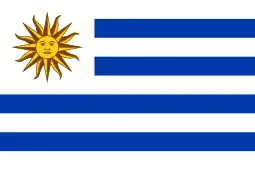Uruguay in the OTI Festival
Uruguay and its OTI member station Teledoce, was one of the founders and main launchers of the OTI Festival. The country debuted in the contest in the first show in Madrid in 1972.[1] Since then, the Uruguayan broadcaster took part every year until the last show which was held in Acapulco in 2000.
| Uruguay | |
|---|---|

| |
| Participating broadcaster | Teledoce |
| Participation summary | |
| Appearances | 27 |
| First appearance | 1972 |
| Highest placement | 5th in 1988 |
| External links | |
| Teledoce website | |
History
Uruguay debuted in the OTI Festival in 1972 with Ronayr Franco and his song "Busco mi destino" (I look for my destiny) created by the Spanish composer Augusto Algueró. Since their debut the Uruguayan trajectory in the OTI Festival was only moderate and only managed to reach the top 10 in five occasions. Although Teledoce was unable to win the contest, it achieved a significant result with Daniel Mantero and his song "Secreto enamorado" (A secret in love) which turned into a hit in the South American country. Since then, the Uruguayan TV channel never managed to reach again the top ten.
Contestants

| Year | Artist | Song | Place | Pts |
|---|---|---|---|---|
| 1998 | María Elisa | Razones (Reasons) | F | |
| 1997 | Javier Fernández | Sin tu amor (Without your love) | SF | |
| 1996 | Los Iracundos | Quiero estrenar (I want to start) | ||
| 1995 | Pájaro Canzani | Un mundo mejor (A better world) | ||
| 1994 | Laura Canoura | Tus sentidos (Your senses) | SF | |
| 1993 | Pablo Estramin | Si eres árbol caído
(If you are a fallen tree) |
||
| 1992 | Gustavo Nocetti | Llegaste a mi
(You arrived to me) |
||
| 1991 | Daniel Mantero | Salvaje (Wild) | SF | |
| 1990 | Mario Echeverría | Sin promesas (Without promises) | ||
| 1989 | Eduardo Fabián | Gracias (Thank you) | ||
| 1988 | Daniel Mantero | Secreto Enamorado
(A secret in love) |
5 | 14 |
| 1987 | Fabricio | Volvamos a empezar
(Let's start again) |
||
| 1986 | Miguel Ángel Montiel | Somos valientes (We are brave) | ||
| 1985 | Nelson Candia | Siempre más (Always more) | ||
| 1983 | Mario Echeverría | Historia del buen ladrón
(History about a good burglar) |
||
| 1982 | Ana María Pascual | Hermandad (Brotherhood) | 12 | 14 |
| 1981 | Ariel | Olvidemos recordando
(Let's forget remembering) |
19 | 4 |
| 1980 | Juca Sheppard | Te lo quedé debiendo
(I owed it to you) |
19 | 4 |
| 1979 | Dolores | Vamos a dar amor (Let's give love) | 16 | 4 |
| 1978 | Horacio Paterno | Canta guitarra, canta
(Sing guitar, sing) |
13 | 3 |
| 1977 | Miguel Bobbio | Quiero vivir (I want to live) | 11 | 2 |
| 1976 | Ronald | Otra vez cantaré (I will sing again) | 6 | 7 |
| 1975 | Ricardo Montaña | Quiero nacer (I want to be born) | 10 | 3 |
| 1974 | María Elisa | La montaña de la vida
(The mountain of life) |
7 | 4 |
| 1973 | Aldo | El mundo es un corazón
(The world is a heart) |
8 | 4 |
| 1972 | Ronayr Franco | Busco mi destino
(I look for my destiny) |
9 | 3 |
References
- Wikipedia, Fuente (May 2011). Festival Oti de la Canción: Festival OTI Por Año, Festival de la OTI Por Países, Participantes Del Festival OTI de la Canción, Camilo Sesto (in Spanish). General Books. ISBN 9781231631553.